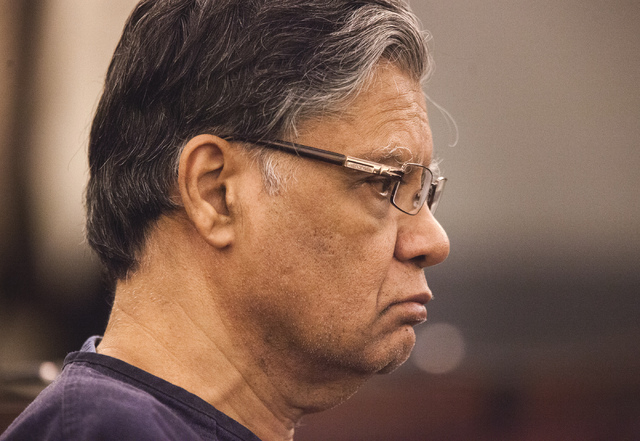Doctor in deadly Las Vegas hepatitis C outbreak guilty of fraud conspiracy

Dr. Dipak Desai pleaded guilty in federal court Thursday in a health care fraud conspiracy stemming from the 2007 hepatitis C outbreak.
The hearing was held before Senior U.S. District Judge Larry Hicks in Reno, but broadcast through a video conference to a Las Vegas courtroom.
Desai, 65, who is already serving time in the Nevada prison system for a state conviction in the hepatitis outbreak, pleaded guilty to one felony count each of conspiracy and health care fraud.
He is to be sentenced before Hicks in Reno on July 9.
Assistant U.S. Attorney Crane Pomerantz, the lead prosecutor in the case, said the plea agreement allows Desai to serve any federal prison time concurrent with his sentence in the state case, but Hicks will have the final word.
Desai has agreed to pay $2.2 million in restitution to the health insurance agencies defrauded in the scheme and forfeit $2.2 million to the government.
“Dr. Desai intentionally defrauded the federal health care system for his own personal enrichment,” Nevada U.S. Attorney Daniel Bogden said after the hearing. “He has finally taken responsibility for his conduct. We are hopeful this closes a long and sordid chapter of harm caused to the people and businesses of Nevada.”
Desai and his former clinic manager, Tonya Rushing, were indicted by a federal grand jury in 2011 on the conspiracy charge and 25 counts of health care fraud. The remaining charges against Desai will be dismissed at sentencing.
Rushing pleaded guilty to the conspiracy count in July and is to be sentenced on May 4.
Both were accused of inflating the length of medical procedures and overbilling Medicare, Medicaid and private health insurance companies for anesthesia services between January 2005 to February 2008.
According to Desai’s plea agreement, Desai and Rushing put intense pressure on clinic employees to treat as many patients a day as possible. State prosecutors alleged in his 2013 trial that Desai ran his Endoscopy Center of Southern Nevada like an assembly line, often handling 60 patients or more a day.
When Hicks asked Desai in court how he wanted to plead to the federal charges, the Indian-born Desai responded through a Gujarati interpreter, “Yes sir, guilty.”
You could not see Desai and his lead defense lawyer, Richard Wright, in the Reno courtroom from the video hookup in Las Vegas. But Desai responded quickly to a series of questions Hicks asked about his knowledge of the plea agreement and did not appear to have trouble understanding the judge.
After Hicks read him a summary of his role in the health care scheme, Desai said he didn’t recall committing all of the acts of wrongdoing, but said he was accepting responsibility for what he did based on Wright’s knowledge of the evidence in the criminal case.
“I do not deny this,” he told Hicks, who later concluded Desai was competent to enter the guilty plea.
Wright had pushed for the Reno hearing so Desai could remain in state custody in Carson City, where he is being treated for “neurological and cardiac” conditions.
Desai, who has suffered three strokes since 2007, is serving a life sentence with the possibility of parole after 18 years under medical watch at the Northern Nevada Correctional Center.
A jury convicted him in July 2013 of 27 criminal counts related to the hepatitis C outbreak, including second-degree murder in the death of infected patient Rodolfo Meana, 77.
Last year, a U.S. Bureau of Prisons psychological evaluation found Desai competent to stand trial but suffering from memory and cognitive impairments. A 2011 state mental evaluation, however, concluded that Desai was exaggerating the effects of his strokes.
The state charges, which included criminal neglect of patients and insurance fraud, involved the hepatitis C infections of Meana and six other patients at Desai’s now-closed endoscopy center. Health officials genetically linked the blood-borne virus in those patients to the clinic.
Prosecutors contended during the trial that unsafe injection practices involving the anesthetic propofol led to the outbreak.
Double-dipping syringes into propofol bottles used on multiple patients spread the virus from source patients infected with hepatitis C in 2007, prosecutors alleged.
Contact Jeff German at jgerman@reviewjournal.com or 702-380-8135. Find him on Twitter @JGermanRJ